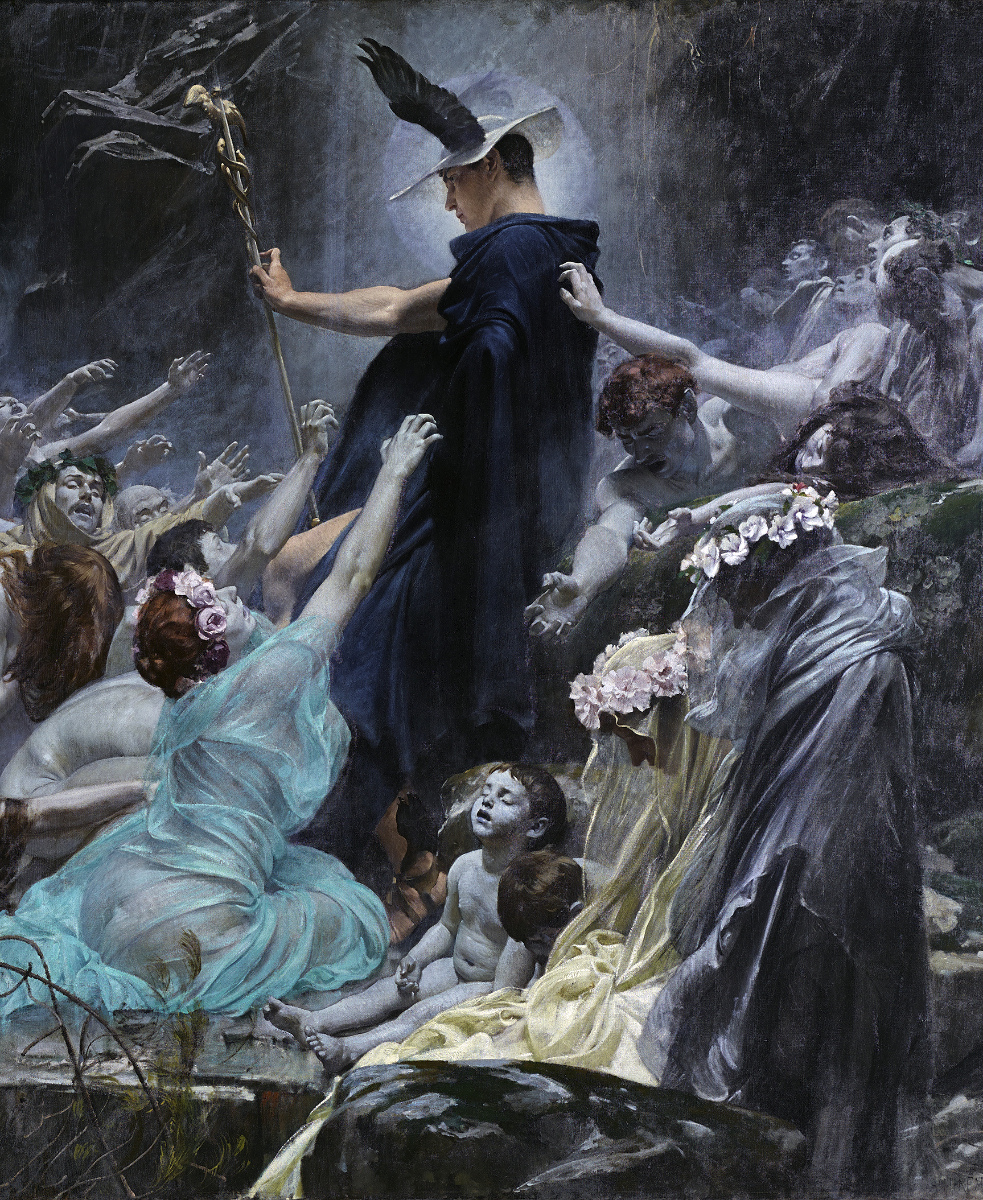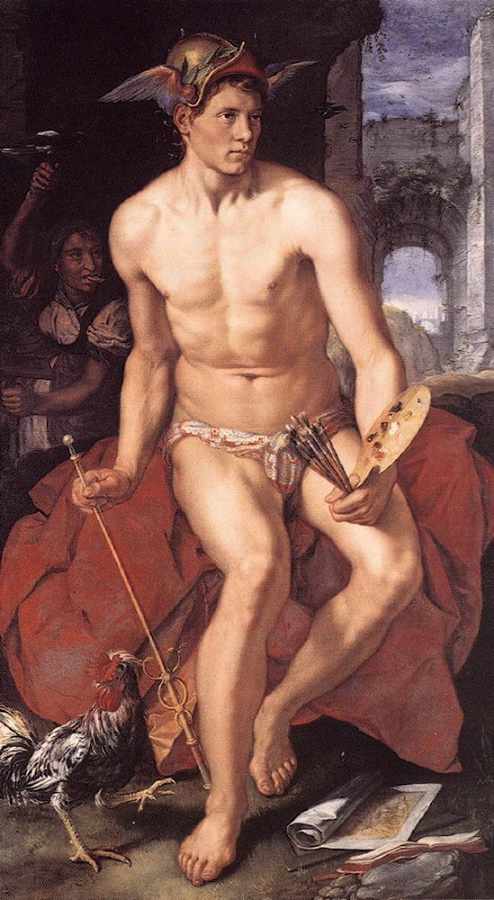Hermes is an Olympian deity in ancient Greek religion and mythology considered the herald of the gods. He is also widely considered the protector of human heralds, travelers, thieves, merchants, and orators. He is able to move quickly and freely between the worlds of the mortal and the divine aided by his winged sandals. Hermes plays the role of the psychopomp or “soul guide”—a conductor of souls into the afterlife. In myth, Hermes functions as the emissary and messenger of the gods, and is often presented as the son of Zeus and Maia, the Pleiad. He is regarded as “the divine trickster”, about which the Homeric Hymn to Hermes offers the most well-known account. Hermes’s attributes and symbols include the herma, the rooster, the tortoise, satchel or pouch, talaria (winged sandals), and winged helmet or simple petasos, as well as the palm tree, goat, the number four, several kinds of fish, and incense. However, his main symbol is the caduceus, a winged staff intertwined with two snakes copulating and carvings of the other gods. In Roman mythology and religion many of Hermes’s characteristics belong to Mercury, a name derived from the Latin merx, meaning “merchandise”, and the origin of the words “merchant” and “commerce. In the Odyssey, Hermes helps the protagonist Odysseus by informing him about the fate of his companions, who were turned into animals by the power of Circe. Hermes instructed Odysseus to protect himself by chewing a magic herb; he also told Calypso of Zeus’s order to free Odysseus from her island to allow him to continue his journey back home. When Odysseus killed the suitors of his wife, Hermes led their souls to Hades.
| Alias Hermes |
| Real Names/Alt Names Hermes |
| Characteristics Trickster, Myths & Legends, Deity, Prehuman Epoch, Public Domain |
| Creators/Key Contributors Homer |
| First Appearance Greek mythology |
| First Publisher ○ |
| Appearance List Literature: Homer’s Odyssey (c. 8th century BCE, English 1614), Homer’s Iliad (c. 8th century BC), Virgil’s Aeneid (29 to 19 BC), 5th century plays by Aeschylus, Sophocles (Ajax, Philoctetes), and Euripides (Hecuba, Rhesus, Cyclops), Plato’s Hippias Minor, Shakespeare’s Troilus and Cressida (1602), Dante Alighieri’s Divine Comedy (1308–1320), Lord Tennyson’s “Ulysses” (1842), The Story of Greece: Told to Boys and Girls by Mary Macgregor (191-?) [Internet Archive], Frederick Rolfe’s The Weird of the Wanderer (1912), James Joyce’s Ulysses (1918–1920), Nikos Kazantzakis’ The Odyssey: A Modern Sequel (1938), Eyvind Johnson’s Return to Ithaca (1946), The Luck of Troy (1961), et. al. Film: The Mysterious Island (1905), L’Odissea (1911), Ulysses (1954), Ulysses (1955), The Trojan Horse (1961), The Fury of Achilles (1962), Ulysses Against the Son of Hercules (1962), The Lion of Thebes (1964), et. al. Comics: Blue Bolt vol. 2 #1-2, Treasure Chest vol. 14 #5. |
| Sample Read The Odyssey (Translated by W. C. Bryant, August, 1871) [Standard eBooks] |
| Description Hermes is an Olympian deity in ancient Greek religion and mythology considered the herald of the gods. He is also widely considered the protector of human heralds, travelers, thieves, merchants, and orators. He is able to move quickly and freely between the worlds of the mortal and the divine aided by his winged sandals. Hermes plays the role of the psychopomp or “soul guide”—a conductor of souls into the afterlife. In myth, Hermes functions as the emissary and messenger of the gods, and is often presented as the son of Zeus and Maia, the Pleiad. He is regarded as “the divine trickster”, about which the Homeric Hymn to Hermes offers the most well-known account. Hermes’s attributes and symbols include the herma, the rooster, the tortoise, satchel or pouch, talaria (winged sandals), and winged helmet or simple petasos, as well as the palm tree, goat, the number four, several kinds of fish, and incense. However, his main symbol is the caduceus, a winged staff intertwined with two snakes copulating and carvings of the other gods. In Roman mythology and religion many of Hermes’s characteristics belong to Mercury, a name derived from the Latin merx, meaning “merchandise”, and the origin of the words “merchant” and “commerce. In the Odyssey, Hermes helps the protagonist Odysseus by informing him about the fate of his companions, who were turned into animals by the power of Circe. Hermes instructed Odysseus to protect himself by chewing a magic herb; he also told Calypso of Zeus’s order to free Odysseus from her island to allow him to continue his journey back home. When Odysseus killed the suitors of his wife, Hermes led their souls to Hades. |
| Source Hermes – Wikipedia |



